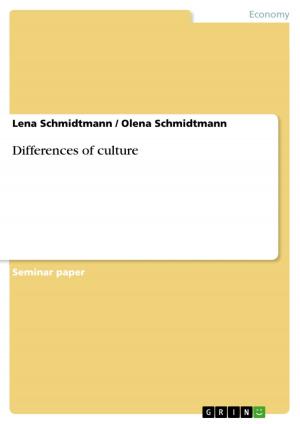Characters in Oscar Wilde's 'The Importance of Being Earnest'
Fiction & Literature, Literary Theory & Criticism, British| Author: | Oliver Zürn | ISBN: | 9783638517485 |
| Publisher: | GRIN Publishing | Publication: | July 5, 2006 |
| Imprint: | GRIN Publishing | Language: | English |
| Author: | Oliver Zürn |
| ISBN: | 9783638517485 |
| Publisher: | GRIN Publishing |
| Publication: | July 5, 2006 |
| Imprint: | GRIN Publishing |
| Language: | English |
Seminar paper from the year 2005 in the subject English Language and Literature Studies - Literature, grade: 2,0, University of Passau (Faculty of Philosophy - Chair of English Literature and Culture), course: Hauptseminar English Comedies 1500-2000, 18 entries in the bibliography, language: English, abstract: WhenThe Importance of Being Earnestwas first performed on 14th of February 1895 in St. James's theatre, it was a huge success and one of the actors said: 'In my fiftythree years of acting, I never remember a greater triumph than the first night ofThe Importance of Being Earnest.The audience rose in their seats and cheered and cheered again.' (Quoted in Bird 1977, 164) Of course, the first one who extoled the play was Oscar Wilde himself: 'the first act is ingenious, the second beautiful, the third abominably clever.' (Quoted in Kohl 1980, 412) Indeed, it is his masterpiece orposthumously - most sucessful play and has enjoyed most revivals up to the present day. However, the play is not only 'good fun' (Reinert 1956, 153), Wilde put also a philosophy in it, as he explained: 'That we should treat all the trivial things of life very seriously, and all the serious things of life with sincere and studied triviality.' (Quoted in Eltis 1996, 171) Furthermore, in the play's subtitle 'A Trivial Comedy for Serious People' he directly addressed the mainly upper-class audience of his time and there is maybe no better or more appropriate expression than 'serious' or 'earnest' to describe Victorianism or the Victorian society. (cf. Kohl 1980, 421) Hence, the play may help us to understand the society at Oscar Wilde's time. Although the play's performance is realistic or naturalistic, i.e. the characters are dressed in contemporary dresses and look exactly like the audience at that time, there must be a reason why a hundred years later we can still laugh about this great farce and wonderful social satire. Maybe the wide range of themes (marriage, love, money, religion, birth and so on)1or the character's peculiarities and follies helped the play to remain up-to-date. But with what kind of characters did Oscar Wilde on the one hand amuse and entertain his audience, on the other hand criticize and satirize spectators and society he lived in? How do the character's follies shed light on the Victorian society at the end of the 19th century?
Seminar paper from the year 2005 in the subject English Language and Literature Studies - Literature, grade: 2,0, University of Passau (Faculty of Philosophy - Chair of English Literature and Culture), course: Hauptseminar English Comedies 1500-2000, 18 entries in the bibliography, language: English, abstract: WhenThe Importance of Being Earnestwas first performed on 14th of February 1895 in St. James's theatre, it was a huge success and one of the actors said: 'In my fiftythree years of acting, I never remember a greater triumph than the first night ofThe Importance of Being Earnest.The audience rose in their seats and cheered and cheered again.' (Quoted in Bird 1977, 164) Of course, the first one who extoled the play was Oscar Wilde himself: 'the first act is ingenious, the second beautiful, the third abominably clever.' (Quoted in Kohl 1980, 412) Indeed, it is his masterpiece orposthumously - most sucessful play and has enjoyed most revivals up to the present day. However, the play is not only 'good fun' (Reinert 1956, 153), Wilde put also a philosophy in it, as he explained: 'That we should treat all the trivial things of life very seriously, and all the serious things of life with sincere and studied triviality.' (Quoted in Eltis 1996, 171) Furthermore, in the play's subtitle 'A Trivial Comedy for Serious People' he directly addressed the mainly upper-class audience of his time and there is maybe no better or more appropriate expression than 'serious' or 'earnest' to describe Victorianism or the Victorian society. (cf. Kohl 1980, 421) Hence, the play may help us to understand the society at Oscar Wilde's time. Although the play's performance is realistic or naturalistic, i.e. the characters are dressed in contemporary dresses and look exactly like the audience at that time, there must be a reason why a hundred years later we can still laugh about this great farce and wonderful social satire. Maybe the wide range of themes (marriage, love, money, religion, birth and so on)1or the character's peculiarities and follies helped the play to remain up-to-date. But with what kind of characters did Oscar Wilde on the one hand amuse and entertain his audience, on the other hand criticize and satirize spectators and society he lived in? How do the character's follies shed light on the Victorian society at the end of the 19th century?















